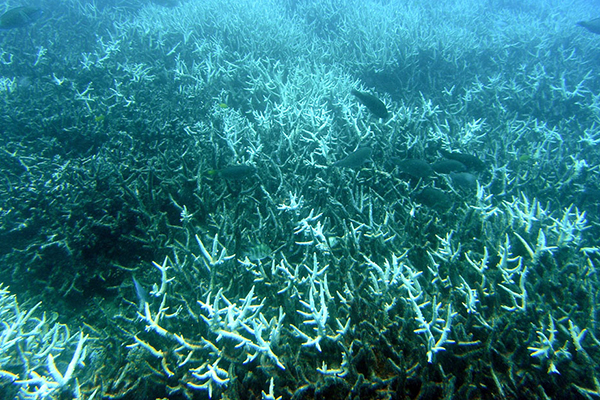Deep ocean warming underscores urgent need for climate action

Ocean temperatures hit a record high in 2024, marking the hottest conditions ever recorded, according to new research from an international team of scientists who monitor Earth’s temperature annually.
The study, published in Advances in Atmospheric Sciences, reveals that this alarming increase extends beyond surface waters, affecting the upper 2,000 meters of the ocean. The findings underscore the profound impact of ocean warming on terrestrial life and stress the urgent need for global action to mitigate its consequences for the planet’s future.
“The broken records in the ocean have become a broken record,” said Lijing Cheng, research lead and professor at the Institute of Atmospheric Physics at the Chinese Academy of Sciences.
Results were consistent: The ocean is warming and 2024 set a new record. One set of results from the Institute of Atmospheric Physics highlights the upper 2000 meters of ocean heat content, using blue and red colors to indicate whether a particular year was colder or hotter than the 1981–2010 baseline. This reference period helps scientists gauge changes over time, with the central message being clear – ocean heat content has been rising steadily yearly.
“OHC has increased steadily by 15~20 ZJ over the past five years despite the La Niña and El Niño cycles,” said Professor Michael Mann from the University of Pennsylvania.
The ocean surface temperature is also setting new records, reflecting the warming at the interface between ocean waters and the atmosphere. Surface temperatures are crucial, as they influence the rate at which heat and moisture transfer from the ocean to the air, directly impacting weather patterns. Since the late 1950s, the rise in surface temperatures has been staggering, contributing to more extreme weather events and altering global climate dynamics.
Study: More than 90% of global aquaculture faces substantial risk from effects of climate change
The warming of the ocean is not uniform, with significant regional variations. The Atlantic Ocean, the Mediterranean Sea and the mid-latitude Southern Ocean are experiencing considerable ocean warming. In contrast, parts of the Northern Pacific Ocean have warmed rapidly, while the tropical regions have shown less consistent warming, largely influenced by the La Niña/El Niño cycle. Additionally, heat has accumulated near both the North and South Poles. This rising ocean temperature affects marine life in various ways, leading to widespread damage to ecosystems, altering habitats, and threatening biodiversity.
“The main way the ocean continues to influence the climate is through accompanying increases in water vapor in the atmosphere that leads to the damaging increases in extremes in the hydrological cycle,” said Dr. Kevin Trenberth, a senior scientist at the National Center for Atmospheric Research, who also participated on the research team. “Water vapor is also a powerful greenhouse gas and increased heating leads to drying and risk of drought and wildfire. But it also fuels storms of all sorts and leads to risk of flooding. That includes hurricanes and typhoons.”
In the past year alone, a whopping 104 countries have recorded their hottest temperatures ever. Extreme weather events – including droughts, heat waves, floods and wildfires – have ravaged regions such as Africa, Southern Asia, the Philippines, Brazil, Europe, the USA, Chile and the Great Barrier Reef. Since 1980, climate disasters have cost the USA nearly $3 trillion.
Monitoring ocean heat is one of the most reliable indicators of our changing climate, providing insights into the escalating impacts of global warming.
“The ocean is our sentinel for planetary warming, acting as the major sink of surplus heat accumulating in Earth climate system as a result of anthropogenic emissions,” said Dr. Karina von Schuckmann at Mercator Ocean International, co-author of the study. “If there continues to be a failure to take action to slow climate change, the disruption, unprecedented change and its implications, costs and loss and damages will continue to increase.”
Now that you've reached the end of the article ...
… please consider supporting GSA’s mission to advance responsible seafood practices through education, advocacy and third-party assurances. The Advocate aims to document the evolution of responsible seafood practices and share the expansive knowledge of our vast network of contributors.
By becoming a Global Seafood Alliance member, you’re ensuring that all of the pre-competitive work we do through member benefits, resources and events can continue. Individual membership costs just $50 a year.
Not a GSA member? Join us.
Author
Tagged With
Related Posts

Responsibility
High ocean temperatures helped make 2023 the hottest year ever recorded
A new study found ocean temperatures were “off-the-chart” in 2023, causing more intense weather patterns and impacting marine life.

Health & Welfare
With warming waters, will fish suffer from oxygen deprivation?
A new study has found that larger fishes are more likely to experience oxygen deficiency in warming water than smaller species.

Responsibility
Hottest ocean temperature record set in 2022 for seventh consecutive year
Research says a record-high ocean temperature combined with greater salinity could create inhospitable ocean conditions for marine life.

Responsibility
Study: 2021 breaks record for hottest ocean temperature
New research shows the ocean temperature in 2021 was the hottest ever recorded by humans, and the effects of ocean warming are "far-reaching."



